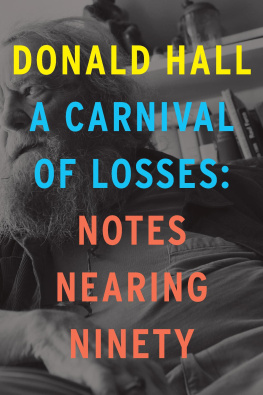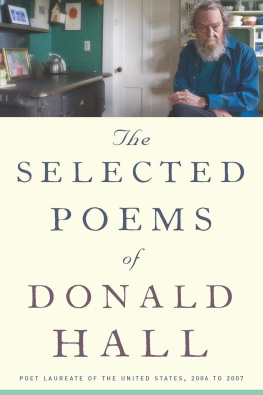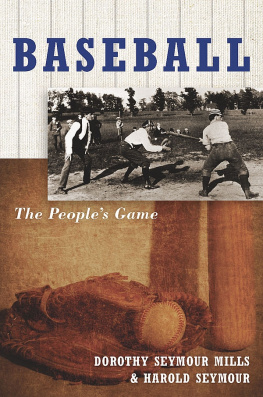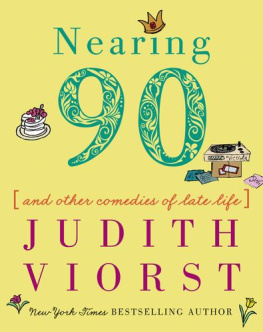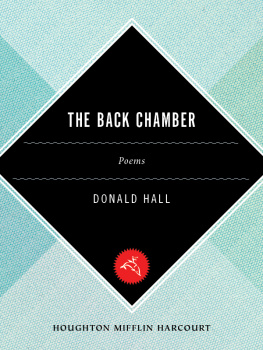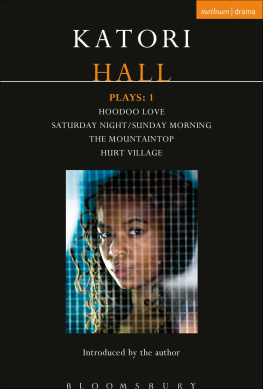Copyright 2018 by Donald Hall
All rights reserved
For information about permission to reproduce selections from this book, write to or to Permissions, Houghton Mifflin Harcourt Publishing Company, 3 Park Avenue, 19th Floor, New York, New York 10016.
hmhco.com
Library of Congress Cataloging-in-Publication Data
Names: Hall, Donald, 1928 author.
Title: A carnival of losses : notes nearing ninety / Donald Hall.
Description: Boston : Houghton Mifflin Harcourt, 2018. | Includes index.
Identifiers: LCCN 2017061816 (print) | LCCN 2017049735 (ebook) | ISBN 9781328826312 (ebook) | ISBN 9781328826343 (hardback)
Subjects: LCSH : Hall, Donald, 1928 | Poets, American20th century. | BISAC: BIOGRAPHY & AUTOBIOGRAPHY / Artists, Architects, Photographers. | FAMILY & RELATIONSHIPS / General.
Classification: LCC PS3515.A3152 (print) | LCC PS3515.A3152 Z46 2018 (ebook) | DDC 811/.54 [b] dc23
LC record available at https://lccn.loc.gov/2017061816
Cover design by Mark R. Robinson
Author photographs Uldis Tirons
Author photograph Linda Kunhardt
v1.0618
for the helpers
Kendel Currier
Carole Colburn
Pam Sanborn
Louise Robie
Mary Blake
I
Notes Nearing Ninety
You Are Old
You are old when you learn its May by noticing that daffodils erupt outside your window. You are old when someone mentions an event two years in the future and looks embarrassed. You are old when the post office delivers your letters into a chair in your living room and picks up your letters going out. You are old when you write letters.
In your eighties it gets hard to walk. Nearing ninety its exhausting to pull your nightshirt on.
You are old when the waiter doesnt mention that you are holding the menu upside down. You are old when an essay of reminiscence takes eighty-four drafts. You are old when mashed potatoes are difficult to chew, or when you guess its Sunday because the mail doesnt come. It might be Christmas.
In your eighties you take two naps a day. Nearing ninety you dont count the number of naps. In your eighties you dont eat much. Nearing ninety, you remember to eat.
You are old when your longtime friend Melvin, turned seventy-five, writes you in rage about becoming old. Working to finish a new book, the author of Essays After Eighty tells Melvin that Melvin knows nothing about old age: Melvin can walk upstairs! Melvin flies to the West Indies with his girlfriend and his wife!
In your eighties you are invisible. Nearing ninety you hope nobody sees you. At nineteen you were six foot two. At ninety-one you will be two foot six.
Solitude Double Solitude
Late in my eighties I remain solitary. I live by myself on one floor of the 1803 farmhouse where my family has lived since the Civil War. After my grandfather died, my grandmother Kate lived here alone. Her three daughters visited her. In 1975 Kate died at ninety-seven, and Jane and I took over the house. Forty-odd years later, two decades after Janes death, I spend my days alone in one of two chairs. From an overstuffed blue chair in my living room, I look out the window at the unpainted old barn, golden and empty of its cows and of Riley the lame horse. I look at a tulip, I look at a 150-year-old maple, I look at snow. In the parlors mechanical chair I write these paragraphs and dictate letters. Also I watch television news, often without listening, and lie back in the generous comfort of solitude. People want to come visit, but mostly I put them off, preserving my continuous silence. My friend Linda spends two nights a week with me. My two best male friends from New Hampshire, who live in Maine and Manhattan, seldom drop by. A few hours a week Carole does my laundry and counts out my pills and picks up after me. I look forward to her presence and feel relief when she leaves. Now and then, especially at night, solitude loses its soft power and loneliness takes over. I am grateful when solitude returns.
Born in 1928, I was an only child. In the Great Depression there were many of us, and Spring Glen Grammar School was eight grades of children with few siblings. From time to time I made a friend during childhood, but friendships never lasted long. Charlie Axel liked making model airplanes out of balsa wood and tissue. So did I, but I was clumsy and dripped cement onto wing paper. His models flew. Later I collected stamps, and so did Frank Benedict. I got bored with stamps. In seventh and eighth grade there were girls. I remember lying with Barbara Pope on her bed, fully clothed and apart while her mother looked in at us with anxiety. Most of the time I liked sitting alone after school in the shadowy living room. While my mother was out shopping or playing bridge with friends and my father added figures in his office, I daydreamed.
In summer, I left my Connecticut suburb to hay with my grandfather on this New Hampshire farm. I watched him milk seven Holsteins morning and night. For lunch I made myself an onion sandwich, a thick slice between pieces of Wonder Bread. At fifteen I went to Exeter for the last two years of high school. Exeter was academically difficult and made Harvard easy, but I loathed itseven hundred identical Republican boys, living two to a room. Solitude was scarce, and I labored to find it or to make it. I took long walks alone, smoking cigars. I found myself a rare single room and remained there as much as I could, reading and writing. Saturday night the other students gathered in the basketball arena, deliriously watching a movie. I remained in my room in solitary pleasure.
At college, dormitory suites had single and double bedrooms. For three years I lived in one bedroom crammed with everything I required. In my senior year I managed to secure a single suite: bedroom and sitting room and bath. At my Oxford college I had two rooms to myself. Everybody did. Then I had fellowships. Then I wrote books. Finally, to my distaste, I had to look for a job. With my first wifepeople married young back then; we were twenty and twenty-threeI settled in Ann Arbor and taught English literature at the University of Michigan. I loved walking up and down in the lecture hall, talking about Yeats and Joyce or saying aloud the poems of Thomas Hardy, John Keats, and Andrew Marvell. These pleasures were hardly solitary, but at home I spent the day in a tiny attic room working on poems. My extremely intelligent wife was more mathematical than literary. We lived together and we grew apart. For the only time in my life I cherished social gatherings, Ann Arbors culture of cocktail parties. Back then, I found myself looking forward to weekends, to crowded parties that permitted me distance from my marriage. On two or three such occasions, on Friday and more on Saturday, we flirted, we drank, we chattedwithout remembering on Sunday what we talked about on Saturday night.
After sixteen years of marriage, my wife and I divorced.
For five years I was alone again, but without the comfort of solitude. I exchanged the miseries of a bad marriage for the miseries of bourbon. I dated a girl who bragged that she drank two bottles of vodka a day. I dated three or four women a week, rarely two in a day. My poems slackened and stopped. I tried to think that I lived in a happy licentiousness. I didnt.
Jane Kenyon was my student. She was smart, she wrote poems, she was funny and frank in class. After the term ended, because I knew she lived in a dormitory near me, one night I asked her to house-sit while I attended an hour-long meeting. (In Ann Arbor, 1970 was the year of breaking and entering.) When I came home, we went to bed. We enjoyed each other, libertine liberty as much as pleasures of the flesh. Later I asked her to dinner, which in that decade always included breakfast. Often we saw each other once a week, still dating others, then twice a weekthen three or four times a week, seeing no one else. One night we spoke of marriage. Quickly we changed the subject, because I was nineteen years older, and if we married she would be a widow so long. We married in April 1972. We lived in Ann Arbor three years, then left Michigan for New Hampshire. She adored this old family house.

